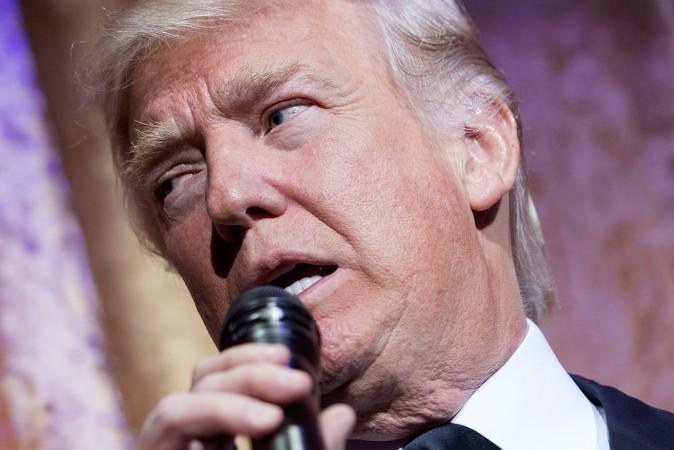
Finally, Donald Trump is here. The real-estate mogul from New York will take the oath of office as the 45th president of the United States on January 20 (Friday), the date when the White House witnesses a change of administration (or the continuation of one) every four years.
A lot has been said and written about Trump's victory in the election on November 8 last year. The man has been derided as an incumbent who has little similarity with his predecessors at the Oval Office.
Can a businessman be a statesman? That has been the common question doing the rounds. But the 69-year-old Republican leader has continued with one tradition of the presidency of the world's largest democracy — the lack of facial hair.
If you follow the over-two-century-old history of the American presidency closely, you will see that the last US president to sport a moustache was William Howard Taft, a Republican who was in power between 1909 and 1913. None of the 17 presidents who ruled in the next 103 years has had facial hair.
With America choosing another clean-shaven man as president, the gap is only going to get wider. And if we take into account the last president to have a beard, history dates even further back into the 19th century. Republican Benjamin Harrison (1889-93) was the man.
Is this a coincidence?
But is it a coincidence that no American president has had facial hair in an entire century? One presumes it is not. Reports suggest that the number of politicians in the US sporting a beard or aa moustache has gone down significantly over the years.
According to recent estimates, less than 5% of members of the US Congress sport a beard or moustache. Among the Republican candidates who failed to beat Trump in the primaries, only Ben Carson had facial hair. This signifies there is a pattern among politicians.
US politicians befriended the razor as women got voting rights
To do away with the facial hair was a 20th-century phenomenon and the 21st century is no different. As in various other aspects of life, politics in America was also seen as a discipline where men dominated.
Facial hair symbolised strength and dominance and was in vogue during and after the American Civil War in the mid-19th century. Until the trend of sporting facial hair set in with Abraham Lincoln, the 16th president, John Quincy Adams was the only president to have it in the 1820s.
Those were the days when women did not even have the right to vote in the US. It was only in 1920 that the women's suffrage became a reality in that country and facts confirm that the US has had no mustachioed or bearded president after gender democratisation happened.
Is having facial hair really politically incorrect in the US?
This explains one aspect of the story. Just like in films and sports and several other public disciplines where displaying facial hair has gone out of fashion, politicians, too, have preferred the same to ensure that they are not seen as somebody who loves war, force and anti-feminism.
However, having said that, clean-shaven presidents have not proved to be saints. Incumbents like Harry S Truman did not think twice before ordering a nuclear attack on Japan nor did Lyndon B Johnson spare Vietnam. Both presidents from the Bush family bombed Iraq, with the younger one also hitting Afghanistan.
Bill Clinton's time saw the White House rocked by a sex scandal while Trump was heard boasting about sexually assaulting women. Each of them is clean-shaven, yet displayed enough deplorable masculine traits.
Other reasons for not sporting facial hair: Domestic and foreign
There have been other reasons for renouncing facial hair as well. American politicians had the strict necessity of remaining politically correct around the middle of the 20th century, both for reasons at home and abroad.
At home, the rise of the hippie culture, of which facial hair was an integral part, made politicians aware of their image as they wanted to maintain a distance from counterculture.
Abroad, the communists and nationalists were subjects of aversion and since those politicians found an accessory in beards, the ideologically-opposed Americans decided to go the opposite way.
Facial hair essentially symbolised the likes of Karl Marx and Fidel Castro, and they were by no means acceptable to the Yankee way of seeing things. The use of the safety razor, which was invented in 1901, also had a role to play in constructing a culture of hairlessness.
But there is also a counter movement in favour of facial hair
For every action, there is always a reaction, they say, and politics is no exception. When American politicians are increasingly bidding goodbye to facial hair, a group named Bearded Entrepreneurs for the Advancement of a Responsible Democracy set up a political action committee in 2013 with the aim of backing politicians with full beard and a mind that is capable of leading the US towards a better future.
The committee felt people who grow and maintain a quality beard also show commitment to public service and thought it is time for facial hair to make a comeback to the political arena.
Either way, it's an exaggerated thought, no doubt. Facial hair or not, male chauvinism has its own ways of manifestation, and even Trump's biggest buddy will find that difficult to deny.
But yet, amid all the speculations and counter arguments, it is indeed a fascinating fact that no American president cared to flaunt a moustache or a beard in the last 103 years, thinking about the public perception. Not many countries, even democracies, have perhaps matched this feat.














